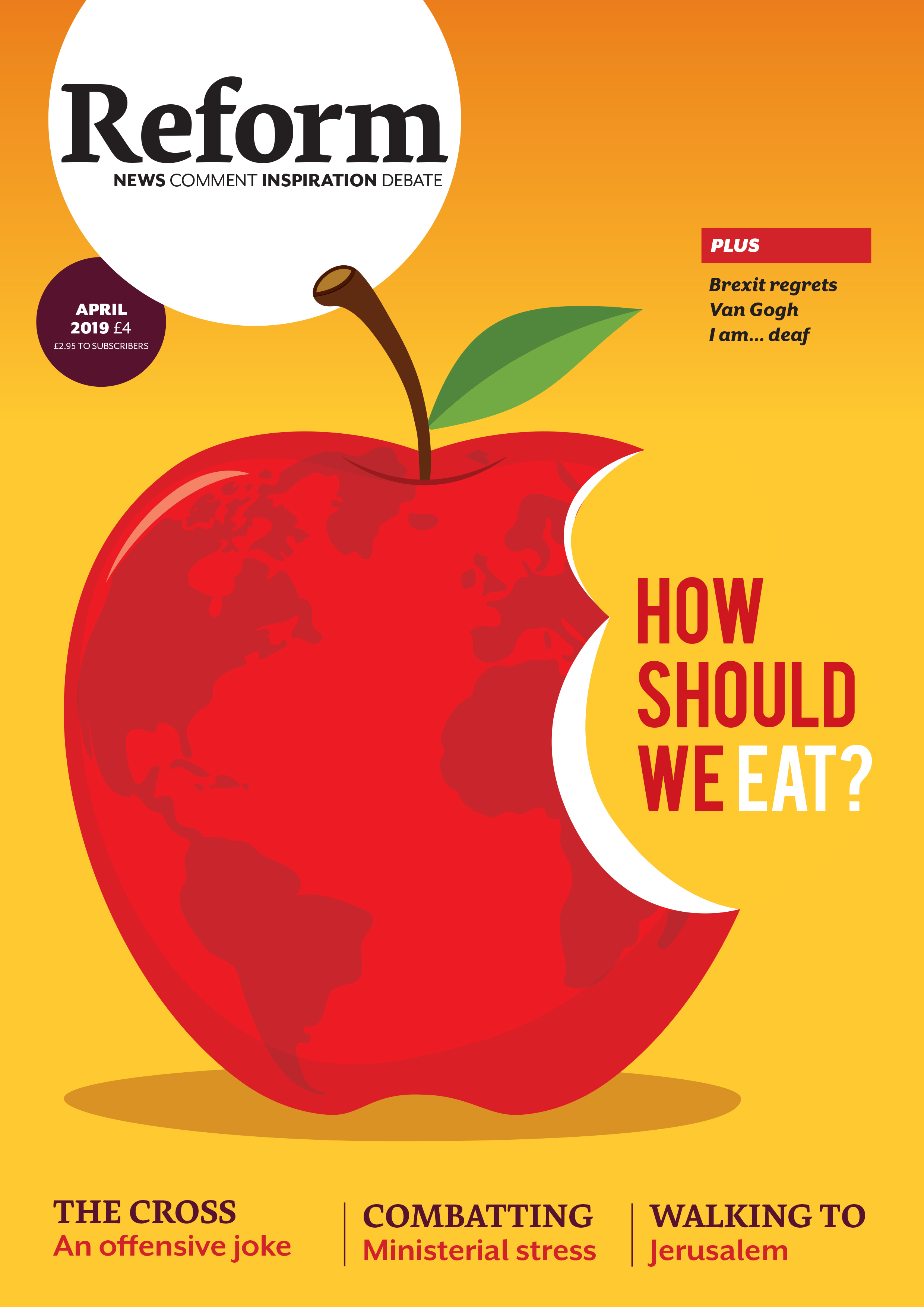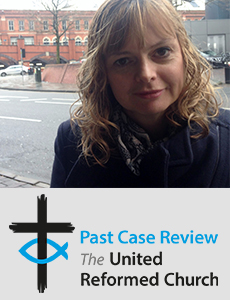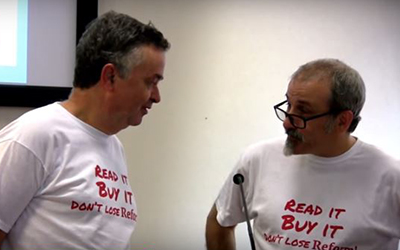
|
|
Shortcut links to: Charity Registration Guidance (PDF | 1mb), Lay preachers, Events, Learning environment, Training for Learning and Serving (TLS), Mission Enablers, Training and Development Officers, Faith and Order, churches information
Share this article

|
|
Shortcut links to: Charity Registration Guidance (PDF | 1mb), Lay preachers, Events, Learning environment, Training for Learning and Serving (TLS), Mission Enablers, Training and Development Officers, Faith and Order, churches information
Download contact details and telephone numbers direct dial numbers (PDF). Please email the relevant person you need to contact. The email protocol is firstname.lastname@urc.org.uk.
Details for individual office holders and key departments are listed below:
United Reformed Church House
86 Tavistock Place
London
WC1H 9RT
Directions to United Reformed Church House

Reform has been out and about meeting readers. Hear why they read the magazine, how it’s used in their church – and what they’ve read that they completely disagree with. Listen now – and give Reform your own feedback here.

Learn from the past and make the future better’ – that’s the challenge to the URC from Dr Lisa Oakley, in the light of the denomination’s Past Case Review (PCR), now running to 30 June 2017. Dr Oakley is leader of the UK’s only undergraduate course in Abuse Studies at Manchester Metropolitan University. In this podcast she asks everyone in the URC to tell others about the Review. Listen now – and read more here.

Listen to Reform magazine’s Editor (Steve Tomkins) and the communications committee convenor (Peter Knowles) explain the importance of buying Reform. Don’t take Reform for granted! Subscribe here (http://www.reform-magazine.co.uk/subscribe/) from just £18. Read it, buy it, don’t lose Reform.













This paper is written particularly with those new to Mission Council in mind but is offered as a helpful summary for all Mission Council members.
The original vision
This was set out in the reports to the Assembly of 1992.
The purpose of the Mission Council is to enable the Church, in its General Assembly, to take a more comprehensive view of the activity and the policy of the Church, to decide more carefully about priorities and to encourage the outreach of the Church to the community.
Its service is directly towards the Assembly, but its concern is with the whole Church and all its members, so it will seek to be aware of the pains and joys, the adventures and hopes of the whole body. As the Assembly is representative of the whole Church, so the Mission Council will listen to and will serve the local churches, to help them in their missionary vocation.
It is a Mission Council and so the aim it will have in mind is to ensure that all we undertake centrally and all we are as a denomination is directed towards the mission of God in the world, towards that Kingdom of justice, peace, forgiveness and hope which is true life and which Christ brings in his person.
They will ask, is this programme, this appointment, this budget, this grant, this statement designed to further the overall mission, or simply to maintain our human structures of institutional life? It is by such criteria that priorities will have to be assessed, not only when new work is proposed but as the existing work of the Church is reviewed.
The members
Each of the 13 synods is represented by four people, including its moderator. These 52 people form the main body of the membership. The other significant group of members is the conveners of Assembly standing committees (apart from the Pastoral Reference and Welfare committee), plus the chair of the URC Trust, eleven people in total. URC Youth has three representatives. The Assembly officers (the current moderators of General Assembly, general secretary, deputy general secretary, clerk, treasurer, and Assembly Arrangements convenor) are members, as are the two immediate past Assembly moderators, the two moderators-elect and the legal adviser. Others in attendance include the moderators’ chaplains, a consensus adviser, observers from ecumenical partner Churches, and Church House staff members. The number attending Mission Council is usually around 90 people.
Mission Council Advisory Group
The Mission Council Advisory Group (MCAG) plans the agenda and necessary follow up and provides support for the Assembly moderators, the general secretary and the deputy general secretary. Its members are the five General Assembly Moderators (immediate past, present and Moderators-elect), General Secretary, Deputy General Secretary, Treasurer, and three members-at-large elected by Mission Council, one of whom is a committee convenor. The current members-at-large are Derrick Dzandu-Hedidor, Nicola Furley-Smith and Elizabeth Nash.
Paper
There are normally two mailings before each Mission Council. The first contains practical information about the meeting and may include other reports if they are ready. The second contains the agenda and timetable and (as far as possible) all other papers to be considered. You need to build reading time into your diary in the week before every meeting.
Meetings
Mission Council meets residentially for 48 hours twice per year. In an Assembly year it meets in March and October/November and in alternate years it meets in May and November/December. The meetings relate very much to the Assembly, responding to its requests, preparing business for its consideration, and acting on its behalf. Input to the Mission Council may come from the Assembly or its committees, a synod or from Mission Council task groups or advisory groups.
Style of meeting
Worship and Bible study are central to our meeting. They are the responsibility of the Assembly moderators and their chaplains. Much of the time we meet in plenary session, with a moderator in the chair and the clerk keeping us in order. The standing orders are the same as those used by Assembly. It helps if people identify themselves when they ask to speak. We use small groups in a variety of ways, both fixed groups and informal buzz groups. The conversation at coffee breaks and over meals is also generally very lively.
Mission Council operates according to the standing orders of the Assembly. These can be found here. A particular feature of our proceedings is the use of consensus decision making. There is a pattern to the discussion of any issue, beginning with a presentation followed by an information session in which questions for clarity may be asked. This is followed by the discussion session in which you are free to express any point you wish to make. You will be issued with orange and blue cards and the moderator will ask at various points whether you feel “warm” or “cool” towards a point that has been made. You will also use your cards to show whether you are in agreement with a proposal that is formally before the Council. If you are confused at any point by the consensus process, the Revd Pauline Barnes, consensus adviser, will be happy to explain how it works.
Very occasionally Mission Council goes into “closed session”. In a closed session, only voting members of the Council are present. Closed sessions are Mission Council’s way of dealing with sensitive, confidential business. Strict rules of confidentiality apply and these will be explained.
In general, because we are seeking the mind of Christ together, each member of Mission Council is asked to strive for the highest standard of listening and engagement.
Communications
The United Reformed Church thrives when its people feel involved in what is going on, participate robustly in our discernment and decision making, and share a sense of ownership of the directions we travel together. Good communication is vital to this. It is the responsibility of the communications department to keep people up to date with United Reformed Church news via social media (specifically facebook and twitter), the URC website and news releases distributed to appropriate publications.
The communications team, working in the hall during all open sessions of Mission Council, will follow the debates and discussions and report on the decisions made. Major newsworthy decisions will be communicated by them as soon as possible. Particularly complicated or sensitive issues are not reported without checking the accuracy and wording with one of the Mission Council/Assembly officers. It is essential that all others present refrain from circulating information from, or opinions about, Mission Council/General Assembly on social networking sites, or by any other means which have potential for widespread dissemination, until reports have been communicated by the communications team.
Although Mission Council meetings take place in wi-fi enabled rooms and many attending will have access to social media sites during business sessions, their primary responsibility is to attend to the business and participate in the decision making. They must refrain from posting on social media sites during business sessions. This restriction is only in place when Mission Council is in session; those attending are free to join in the online debates during breaks and after the close of business.
Those using social media at any time should note that everything written and shared on social media sites is the responsibility of the author and subject to the same libel laws as any other form of written communication. The points made above in relation to the style of meeting also outline the standards of generous courtesy that are expected of Mission Council members in all their social media posts.
Advice
Advice is welcome from all quarters, but Mission Council has several standing advisory groups in addition to the Mission Council Advisory Group described above. The Human Resources Advisory Group (HRAG) reviews all the key staff posts on a regular basis, and considers imminent vacancies and proposals for new posts. The Law and Polity Advisory Group (LPAG) advises on matters of polity and government legislation. The Ministerial Incapacity and Discipline Advisory Group (MIND) oversees the processes for discipline and incapacity and brings proposals to amend them as necessary. A !---->Listed Buildings Advisory Group!----> reports annually.
Mission Council also appoints short term task groups to undertake specific pieces of work.
Making connections
All of this is about what happens at Mission Council. Whilst at their best our meetings are “aware of the pains and joys, the adventures and hopes of the whole body”, to many in the Church, Mission Council seems very remote. Therefore a key role of the synod representatives in particular is to act as channels of communication, before and after meetings, and in both directions.
Administration
The administration and planning of Mission Council is the responsibility of the general secretariat, to whom all reasonable comments and questions may be addressed.
Revised March 2013
The United Reformed Church takes your privacy very seriously. We are committed to safeguarding the privacy of our website visitors and service users. We have set out how we deal with your personal data, your privacy, and other various rights you have, when you use this website or supply information to us.
This policy applies where we are acting as a data controller with respect to the personal data of our website visitors and service users; in other words, where we determine the purposes and means of the processing of that personal data.
We use cookies on our website. Insofar as those cookies are not strictly necessary for the provision of our website and services, we will ask you to consent to our use of cookies when you first visit our website.
The United Reformed Church, who are also referred to in this policy as, "we", "us" and "our" is the data controller, who collects your information and determines the way and purpose for which your personal data is processed. The United Reformed Church is responsible for looking after your personal data, in accordance with all relevant UK Privacy Laws. If at any time you have any concerns or questions about your personal data, please do not hesitate to contact The United Reformed Church.
If you have any concerns, enquiries or complaints about matters affecting your privacy or any other general data protection issue, please do not hesitate to get in contact with us. You can get in touch with us via email or post; our contact details are as follows:
Email: info@urc.org.uk
Postal address
United Reformed Church House
86 Tavistock Place
London
WC1H 9RT
We would like you to know that you also have the right to complain to the Information Commissioner’s Office (the ICO), at any time. the ICO is the UK’s independent body set up to uphold information rights in the public interest, to promote openness by public bodies and data privacy for individuals.
You can contact the ICO via their helpline number: 0303 123 1113 (Monday to Friday from 9am to 5pm).
Your personal data/information may be collected by us. This is any information belonging to you, that can be used to identify you. Personal data can be categorized under different headings, and so we would like you to know what precisely we may collect from you.
Identity data: information such as any name you’re known by, including usernames, your marital status, your title, date of birth and gender.
Contact data: information such as your postal and email address and your telephone numbers
Technical data: information such as your internet protocol (IP) address, your login data, browser type and version, your location and time zone setting, operating system and platform and other technology on the devices you use to access this website.
Profile data: information such as your username and password, your feedback and survey responses
Usage data: information about how you use our website, products, and services
Communication data: information about your preferences in receiving material from us and your communication preferences.
Personal data also consists of what is known as Special Category data. These need more protection because they are sensitive. They include details about your race or ethnicity, your religious or philosophical beliefs, your sex life, sexual orientation, your political opinions, trade union membership, information about your health and genetic and biometric data. We do not collect any Special Category data, nor do we collect any information about criminal convictions and offences.
Still there are occasions where we may receive Special Category data from you, through direct interaction for instance. On such occasions, we may receive information from you about your race or ethnic orientation, your religious or philosophical beliefs, your sex life or sexual orientation or your health.
Processing these types of Special Category data is allowed under Data Protection law, where we have received explicit consent from you and, or, where it is carried out by a religious entity during its legitimate activity.
We may use different methods to collect your personal data. Please understand that we can only collect your personal data with your consent.
We may collect your personal data through direct interactions with you. We may obtain your identity and contact data, when you complete any of our forms or by you corresponding with us by post, on the telephone, via email or otherwise. Direct interaction with us also occurs when you provide personal data as you
We may also automatically collect technical data about your equipment, browsing actions and patterns, when you interact with our website.
We may also receive your personal data from other bodies within the United Reformed Church, such as your local churches and synods.
We will only use your personal data in the following circumstances.
There are various purposes for which we may use your personal data. For a detailed breakdown of these purposes, the type of personal data required and our lawful basis for processing your personal information, please get in contact with us.
We will only use your personal data for the purposes for which we collected it, unless we reasonably consider that we need to use it for another reason and that reason is compatible with the original purpose. If you wish to get an explanation as to how the processing for the new purpose is compatible with the original purpose, please contact us.
If we need to use your personal data for an unrelated purpose, we will notify you and we will explain the legal basis which allows us to do so.
Please note that we may process your personal data without your knowledge or consent, in compliance with the above rules, where this is required or permitted by law.
We may share your personal data with other third parties within the United Reformed Church, for the purpose, for which your data is collected and used.
We have put in place appropriate security measures to prevent your personal data from being accidentally lost, used, or accessed in an unauthorised way, altered, or disclosed. In addition, we limit access to your personal data to those employees, agents, contractors and other third parties who have a need to know. They will only process your personal data on our instructions, and they are subject to a duty of confidentiality.
We have put in place procedures to deal with any suspected personal data breach and will notify you and any applicable regulator of a breach where we are legally required to do so.
We will only retain your personal data for as long as reasonably necessary to fulfil the purposes we collected it for, including for the purposes of satisfying any legal, regulatory, accounting or reporting requirements. We may retain your personal data for a longer period in the event of a complaint or if we reasonably believe there is a prospect of litigation in respect to our relationship with you.
To determine the appropriate retention period for personal data, we consider the amount, nature and sensitivity of the personal data, the potential risk of harm from unauthorised use or disclosure of your personal data, the purposes for which we process your personal data and whether we can achieve those purposes through other means, and the applicable legal and regulatory requirements.
Details of retention periods for different aspects of your personal data are available in our retention policy which you can request by contacting us.
Under certain circumstances, you have rights under the Data Protection Act 2018 and the UK GDPR, in relation to your personal data. You have the right to:
Request access to your personal data
Request correction of the personal data that we hold about you.
Request erasure (deletion) of your personal data.
Object to processing of your personal data
Request restriction of processing of your personal data.
Request the transfer of your personal data to you or to a third party.
Withdraw consent at any time
If you wish to exercise any of the rights set out above, please contact us.
If you would like to access your personal data that we possess, you will need to contact us, to make a Subject Access Request.
You will not have to pay a fee to access your personal data (or to exercise any of the other rights). However, we may charge a reasonable fee if your request is clearly unfounded, repetitive, or excessive. Alternatively, we could refuse to comply with your request in these circumstances.
We may need to request specific information from you to help us confirm your identity and ensure your right to access your personal data (or to exercise any of your other rights). This is a security measure to ensure that personal data is not disclosed to any person who has no right to receive it. We may also contact you to ask you for further information in relation to your request to speed up our response.
We try to respond to all legitimate requests within one month. Occasionally it could take us longer than a month if your request is particularly complex or you have made several requests. In this case, we will notify you and keep you updated.
We keep our privacy policy under regular review. This version was last updated on 30 September 2021.
It is important that the personal data we hold about you is accurate and current. Please keep us informed if your personal data changes during your relationship with us.
You can contact us in the following ways:
Email info@urc.org.uk
Postal address
United Reformed Church House
86 Tavistock Place
London
WC1H 9RT
Privacy notices
Find out more about our different privacy notices: